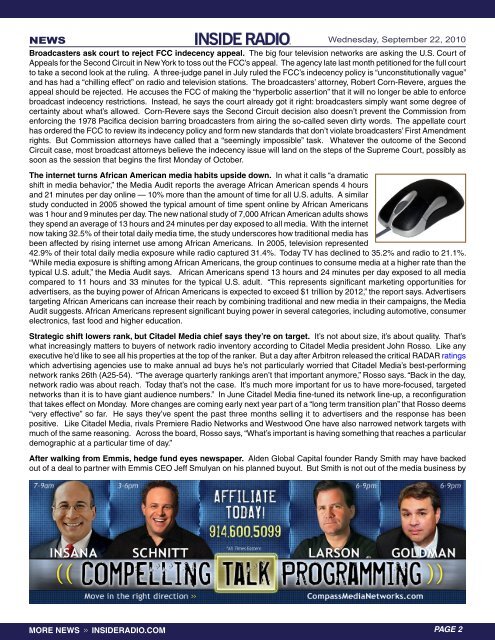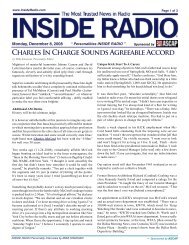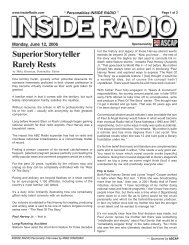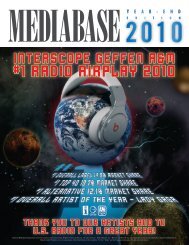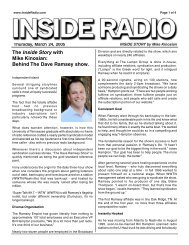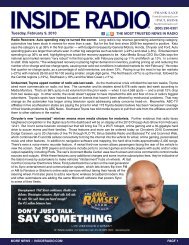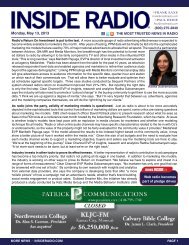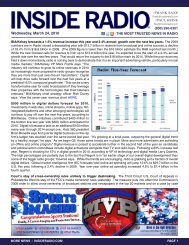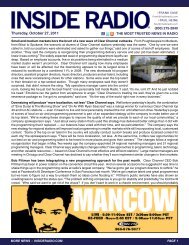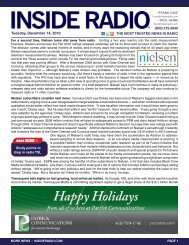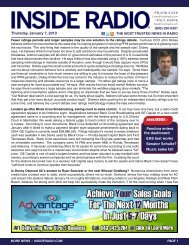news INSIDE >> Wednesday, September 22, 2010
news INSIDE >> Wednesday, September 22, 2010
news INSIDE >> Wednesday, September 22, 2010
- No tags were found...
Create successful ePaper yourself
Turn your PDF publications into a flip-book with our unique Google optimized e-Paper software.
NEWS <strong>Wednesday</strong>, <strong>September</strong> <strong>22</strong>, <strong>2010</strong>Broadcasters ask court to reject FCC indecency appeal. The big four television networks are asking the U.S. Court ofAppeals for the Second Circuit in New York to toss out the FCC’s appeal. The agency late last month petitioned for the full courtto take a second look at the ruling. A three-judge panel in July ruled the FCC’s indecency policy is “unconstitutionally vague”and has had a “chilling effect” on radio and television stations. The broadcasters’ attorney, Robert Corn-Revere, argues theappeal should be rejected. He accuses the FCC of making the “hyperbolic assertion” that it will no longer be able to enforcebroadcast indecency restrictions. Instead, he says the court already got it right: broadcasters simply want some degree ofcertainty about what’s allowed. Corn-Revere says the Second Circuit decision also doesn’t prevent the Commission fromenforcing the 1978 Pacifica decision barring broadcasters from airing the so-called seven dirty words. The appellate courthas ordered the FCC to review its indecency policy and form new standards that don’t violate broadcasters’ First Amendmentrights. But Commission attorneys have called that a “seemingly impossible” task. Whatever the outcome of the SecondCircuit case, most broadcast attorneys believe the indecency issue will land on the steps of the Supreme Court, possibly assoon as the session that begins the first Monday of October.The internet turns African American media habits upside down. In what it calls “a dramaticshift in media behavior,” the Media Audit reports the average African American spends 4 hoursand 21 minutes per day online — 10% more than the amount of time for all U.S. adults. A similarstudy conducted in 2005 showed the typical amount of time spent online by African Americanswas 1 hour and 9 minutes per day. The new national study of 7,000 African American adults showsthey spend an average of 13 hours and 24 minutes per day exposed to all media. With the internetnow taking 32.5% of their total daily media time, the study underscores how traditional media hasbeen affected by rising internet use among African Americans. In 2005, television represented42.9% of their total daily media exposure while radio captured 31.4%. Today TV has declined to 35.2% and radio to 21.1%.“While media exposure is shifting among African Americans, the group continues to consume media at a higher rate than thetypical U.S. adult,” the Media Audit says. African Americans spend 13 hours and 24 minutes per day exposed to all mediacompared to 11 hours and 33 minutes for the typical U.S. adult. “This represents significant marketing opportunities foradvertisers, as the buying power of African Americans is expected to exceed $1 trillion by 2012,” the report says. Advertiserstargeting African Americans can increase their reach by combining traditional and new media in their campaigns, the MediaAudit suggests. African Americans represent significant buying power in several categories, including automotive, consumerelectronics, fast food and higher education.Strategic shift lowers rank, but Citadel Media chief says they’re on target. It’s not about size, it’s about quality. That’swhat increasingly matters to buyers of network radio inventory according to Citadel Media president John Rosso. Like anyexecutive he’d like to see all his properties at the top of the ranker. But a day after Arbitron released the critical RADAR ratingswhich advertising agencies use to make annual ad buys he’s not particularly worried that Citadel Media’s best-performingnetwork ranks 26th (A25-54). “The average quarterly rankings aren’t that important anymore,” Rosso says. “Back in the day,network radio was about reach. Today that’s not the case. It’s much more important for us to have more-focused, targetednetworks than it is to have giant audience numbers.” In June Citadel Media fine-tuned its network line-up, a reconfigurationthat takes effect on Monday. More changes are coming early next year part of a “long term transition plan” that Rosso deems“very effective” so far. He says they’ve spent the past three months selling it to advertisers and the response has beenpositive. Like Citadel Media, rivals Premiere Radio Networks and Westwood One have also narrowed network targets withmuch of the same reasoning. Across the board, Rosso says, “What’s important is having something that reaches a particulardemographic at a particular time of day.”After walking from Emmis, hedge fund eyes <strong>news</strong>paper. Alden Global Capital founder Randy Smith may have backedout of a deal to partner with Emmis CEO Jeff Smulyan on his planned buyout. But Smith is not out of the media business byMORE NEWS >> InsideRadio.compage


